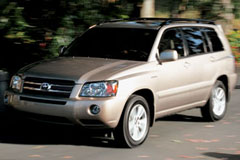Car Review of the 2006 Toyota Highlander Hybrid-Fuel Full-Size Sport Utility Vehicle

Base MSRP Range: $33,030-$39,290
Base Invoice Range: $29,561-$35,198
MSRP As Tested: $33,030
Versions: 2WD, AWD
Vehicle Category: Hybrid-Fuel Full-Size Sport Utility Vehicle
Engine Location: Front Engine
Drive Wheels: All-Wheel Drive, Front-Wheel Drive.
Standard Engine: 3.3-liter, Dual Overhead Cam, 24-valves, VVTi, V-6,268 - horsepower at 5600 rpm and 212 lb-ft torque at 4400 rpm.
Fuel Economy (city/hwy): 2WD 30/26, AWD 32/27.
Transmission: CVT automatic.
Standard Safety Features: Driver and passenger airbags, Front side airbags, Front and 2nd-row curtain side airbags w/rollover sensor, Tire pressure monitoring system, "> Anti-lock four-wheel disc brakes, Brake assist, Antiskid system.
Competition: Ford Explorer, Honda Pilot.

No, you don't have to plug it in.
That's the answer to the question lots of people asked about the 2006 Toyota Highlander Hybrid. They simply couldn't figure how a big, muscular SUV with great power and acceleration could get the same gas mileage as some four-cylinder compact cars. But, thanks to the miracle of gas-electric hybrid technology, that's exactly what this SUV does.
The first hybrid cars weren't brilliant performers. Even though they used the same basic principle as hybrid cars for sale today -- electric motors and a small gasoline engine working together to save fuel and cut emissions -- their acceleration was mediocre at best. It wasn't bad, but it definitely wasn't anything to brag about.

This new Highlander Hybrid, though, accelerates just as well as you'd expect any SUV to launch. It feels like it has a big V6 or small V8 gasoline engine under the hood, but in reality it's only got a puny 3.3-liter V6. That's still enough to reach 60 mph from a standstill in 7.3 seconds.
Pretty impressive.
Even more eye-popping is the Highlander Hybrid's fuel economy estimate, which, according to the EPA, is 33 miles per gallon in the city and 28 mpg on the highway. To put that in perspective, the combined fuel efficiency for this vehicle is twice that of the average V8-powered SUV and is even better than the current EPA average -- 27.1 mpg -- for a four-cylinder, compact sedan.
Wow.
To be honest, the real-world performance isn't quite as optimistic as the EPA's estimate, which was measured in laboratory conditions. I averaged around 23 mpg in combined city/highway driving, including lots of jackrabbit starts (just for serious, journalistic testing purposes, of course. Really. Stop laughing.)

Other than the increased gas mileage, there's very little that makes this SUV feel different from a gas-powered version on the road. The engine shuts off to save fuel every time you roll to a stop and the brakes feel slightly different at the pedal, but other than that it feels like the regular Highlander.
That means it has a soft, smooth ride, a quiet cabin and almost car-like handling. It feels like a really tall Camry, which is a good thing.
It also comes with a long list of upscale features, which -- believe it or not -- is one thing I hate about today's hybrids.
Standard equipment on the Highlander Hybrid includes a cabin air filter, eight-way power driver's seat with power lumbar support, power windows and locks, a "deluxe" stereo with CD player, a built-in garage door opener, and remote keyless entry. Those are all good features to have and are actually priced competitively starting at $33,000.

My gripe is that so many hybrid vehicles -- ones that are supposedly built to save their buyers lots of money on fuel costs -- are only available with a bunch of expensive add-ons. I'm sure there are families that would love to buy a basic, stripped-down hybrid but can't afford one because of all the expensive, unnecessary gizmos the manufacturer tacks on without giving the consumer a choice.
Besides, aren't the families who really need to save money on gas also the ones who can't afford a bunch of high-end doodads?
In any case, the Highlander Hybrid represents a major leap in technology because it doesn't sacrifice performance for efficiency. It's a no-compromise SUV for the family, and it just happens to get mind-blowing gas mileage.
Pros: It has the performance of a V8-powered SUV but gets the gas mileage of a four-cylinder compact car. It has a soft, compliant ride and a lot of high-end features as standard equipment.
Cons: If you want a no-frills SUV with hybrid technology, you're out of luck. Like other manufacturers, Toyota chooses to load expensive, upscale amenities into its hybrids, forcing them out of the price range for people who need most to save money on gas.

Ratings (1-10)
- Style: 6
- Performance: 7
- Price: 5
- Handling: 7
- Ride: 8
- Comfort: 8
- Quality: 10
- Overall: 7
More Data
Where Built: Japan
Major Options: Leather Package, Convenience package, Cold weather package. Power sunroof, Navigation system, Fog lights, Side steps, Alloy wheels and postproduction options also available.
Seating: 7.
Number of Rows: 3.
Length in Inches: 184.6
Warranties: 3 years/36,000 miles bumper to bumper, 5/50,000 miles Extended powertrain (In CA, hybrid components are covered by a 10/150,000 warranty), 5 years/unlimited miles Corrosion protection, 3 years/36,000 miles Roadside assistance.
Weight in Pounds: 3,750 lbs.
Cargo Capacity in Pounds: 1,100 - 1,500 lbs.
Gross Maximum Vehicle Weight in Pounds: 4,541 lbs. - 4,674 lbs.
Towing Capacity in Pounds: 3,500 lbs.
Gas Tank Capacity in Gallons: 18.8 FWD
Destination Charge: $565




